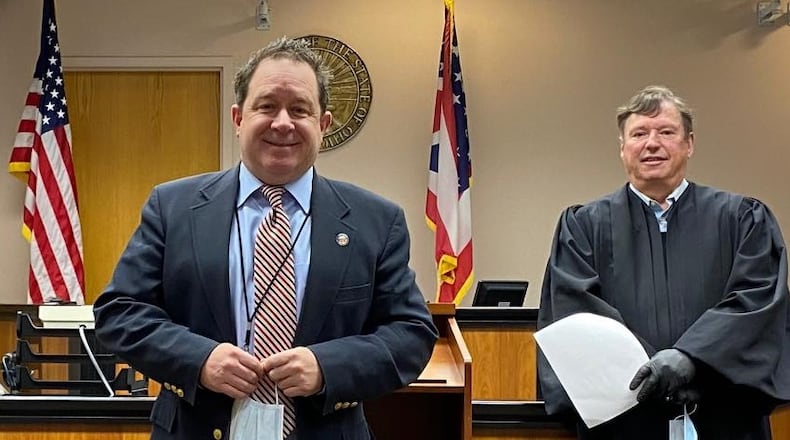Franks hearings are legal proceedings that question the legitimacy of information used to create a search warrant and ask the court to suppress the warrant. Visiting Judge Jonathan Hein is presiding over the case.
Attorneys Jon Paul Rion and Catherine Breault, who represent Foley, on Friday challenged parts of an affidavit drafted by an Ohio State Auditor’s Office special investigator, stating they contained “material misstatements or omissions.”
This affidavit was used for search warrants conducted at the Montgomery County Clerk of Courts office in 2022, when state investigators raided Foley’s office.
Breault and Rion referenced the transcript of interviews a state investigator had with a former employee of the Montgomery County Clerk of Courts between Oct. 31 to Nov. 2, 2022. Both attorneys argued that the testimony of this former employee was misrepresented in the state’s affidavit.
“There’s a pattern of statements by the confidential witness making somewhat of a statement and the investigator drawing inferences herself, drawing conclusions, and presenting them to the court as confirmed facts,” Breault said on Friday.
Breault said these speculations focused on employee bonuses related to campaign donations and the use of county resources and offices for campaign activity. She argued the affidavit also omitted key statements made by the witness, where he detailed that Foley did not engage in activity that weighed employees’ bonuses with the donations they made to his campaign.
Thomas Anger, representing the Ohio Auditor’s Office Special Investigations Unit (SIU), said that at the beginning of its investigation, SIU was initially concerned with a “bonus-for-donations scheme” in Foley’s office.
Anger argued, however, that information about bonuses is not material.
“There’s no suggestion in here (the affidavit) that Mr. Foley actually gave out the bonuses in a manner that concerned the state,” he said. “We didn’t charge him with any crimes pertaining to the bonuses.”
Anger also argued that there is no reasonable expectation of privacy for the county-owned computers in Foley’s office, and state investigators used a search warrant for Foley’s office in the event that some documents were not considered public record or were located in drawers or cabinets.
Attorneys for Foley and Piergies have asked to file certain records to the court under seal, according to court records. It’s unclear what those documents contain.
Hein will make a decision regarding the search warrant in the coming weeks.
Foley and Piergies were indicted in July this year; both have maintained their innocence since then. Foley was charged with attempted unlawful interest in a public contract, complicity to commit unlawful interest in a public contract, theft in office, unauthorized use of computer, cable or telecommunication property, and misdemeanor counts of solicitation of political contributions from public employees and prohibition against partisan political activity.
Piergies faces charges of attempted unlawful interest in a public contract related to his son’s employment.
About the Author

